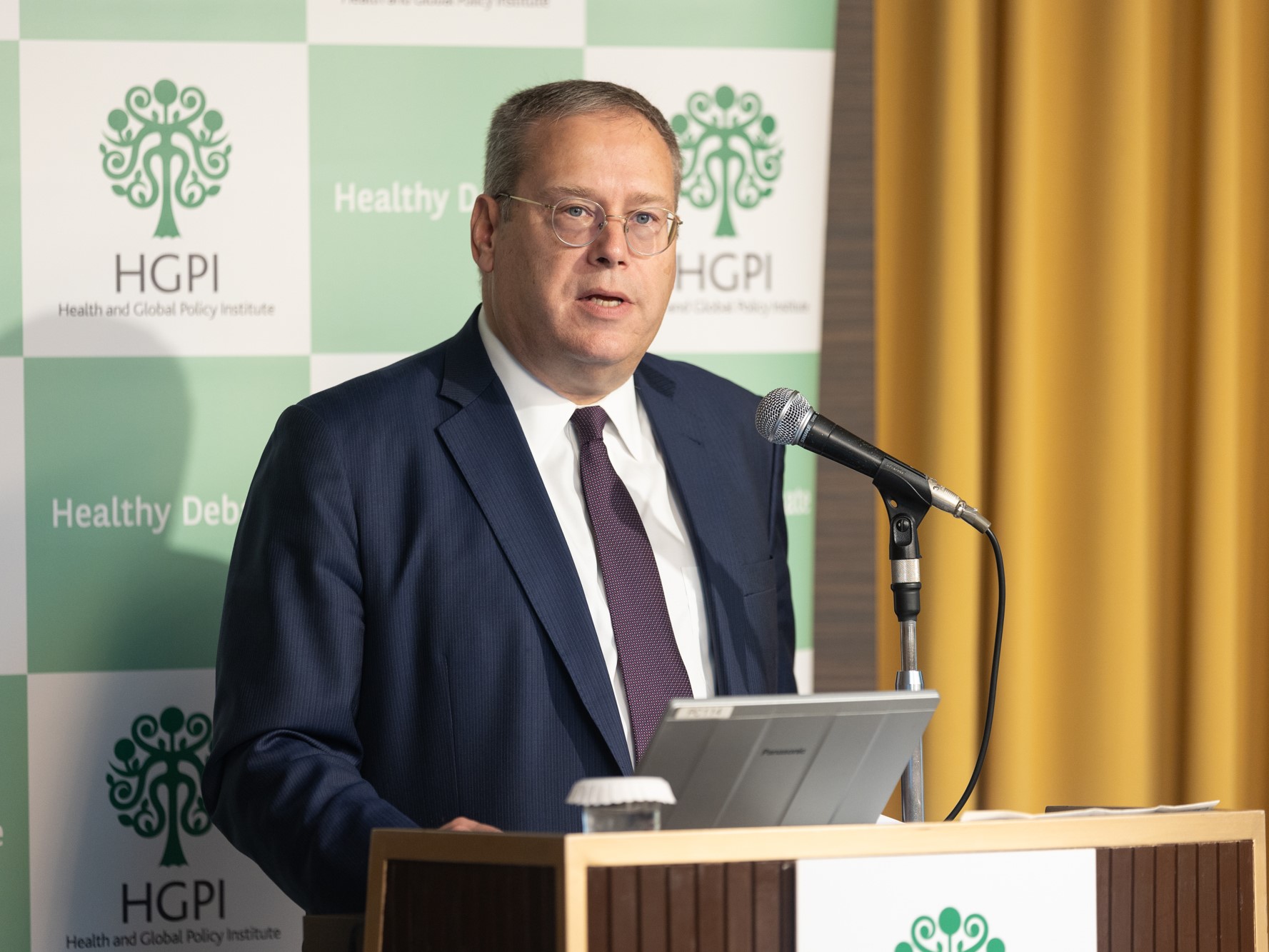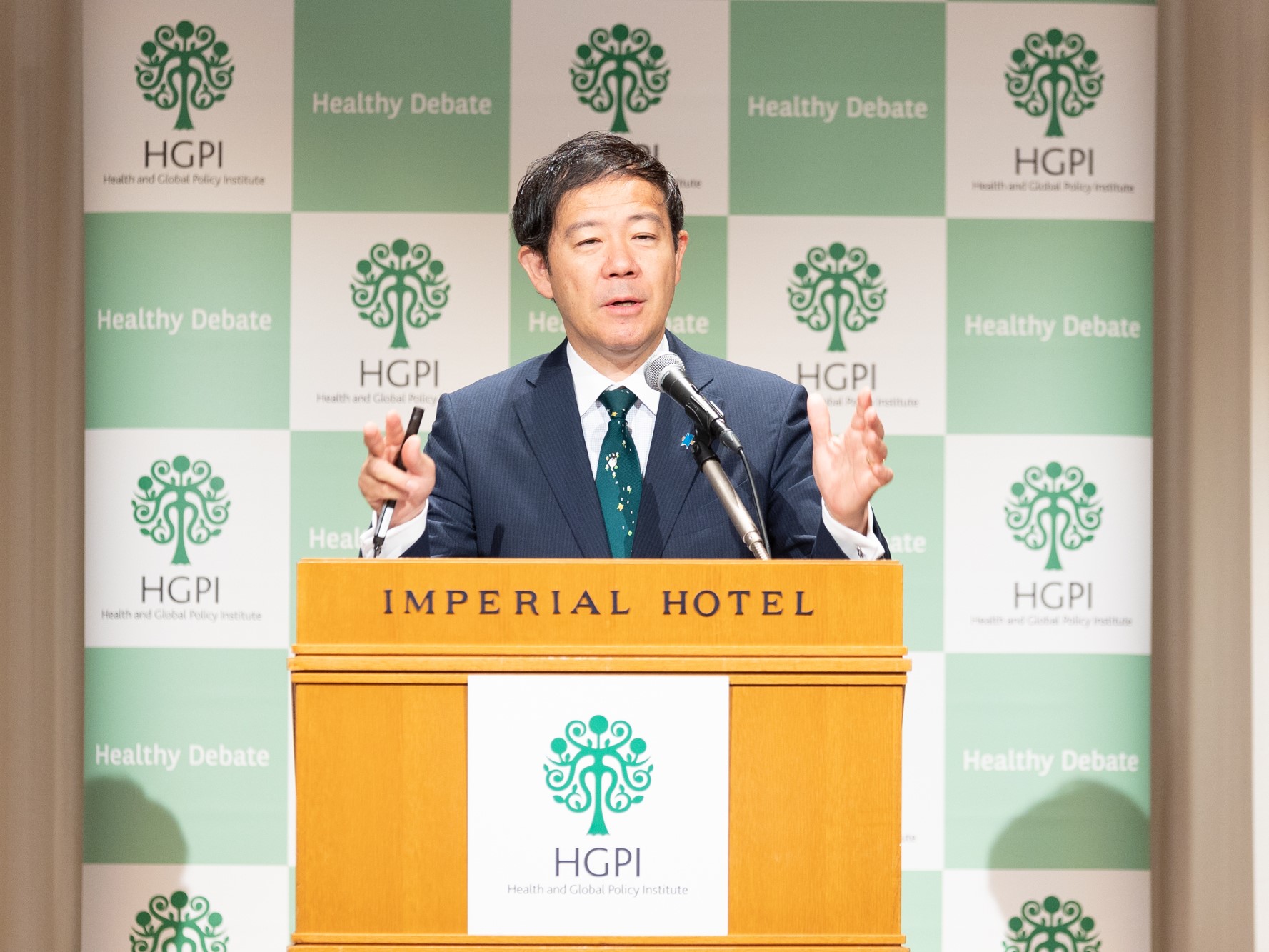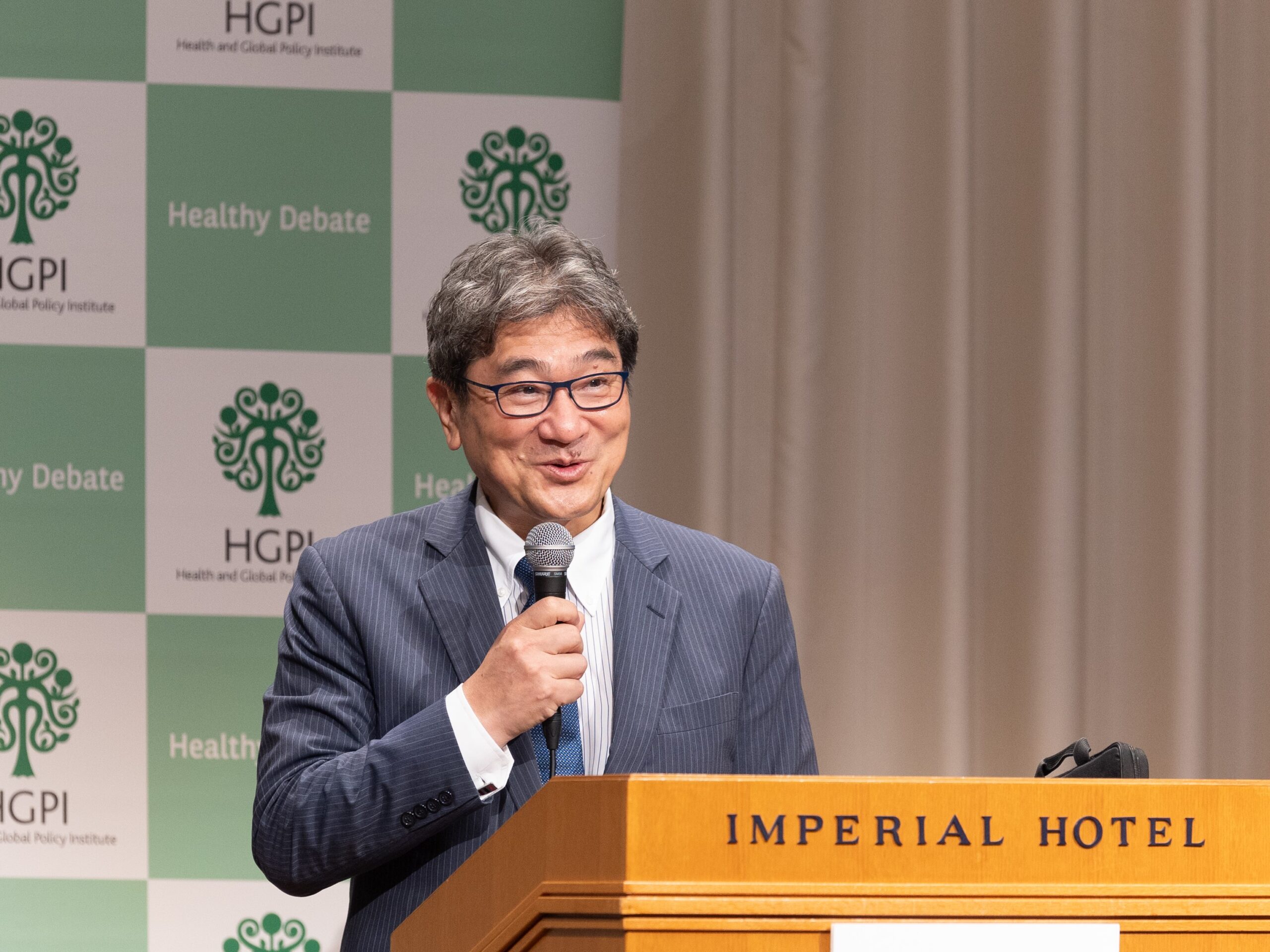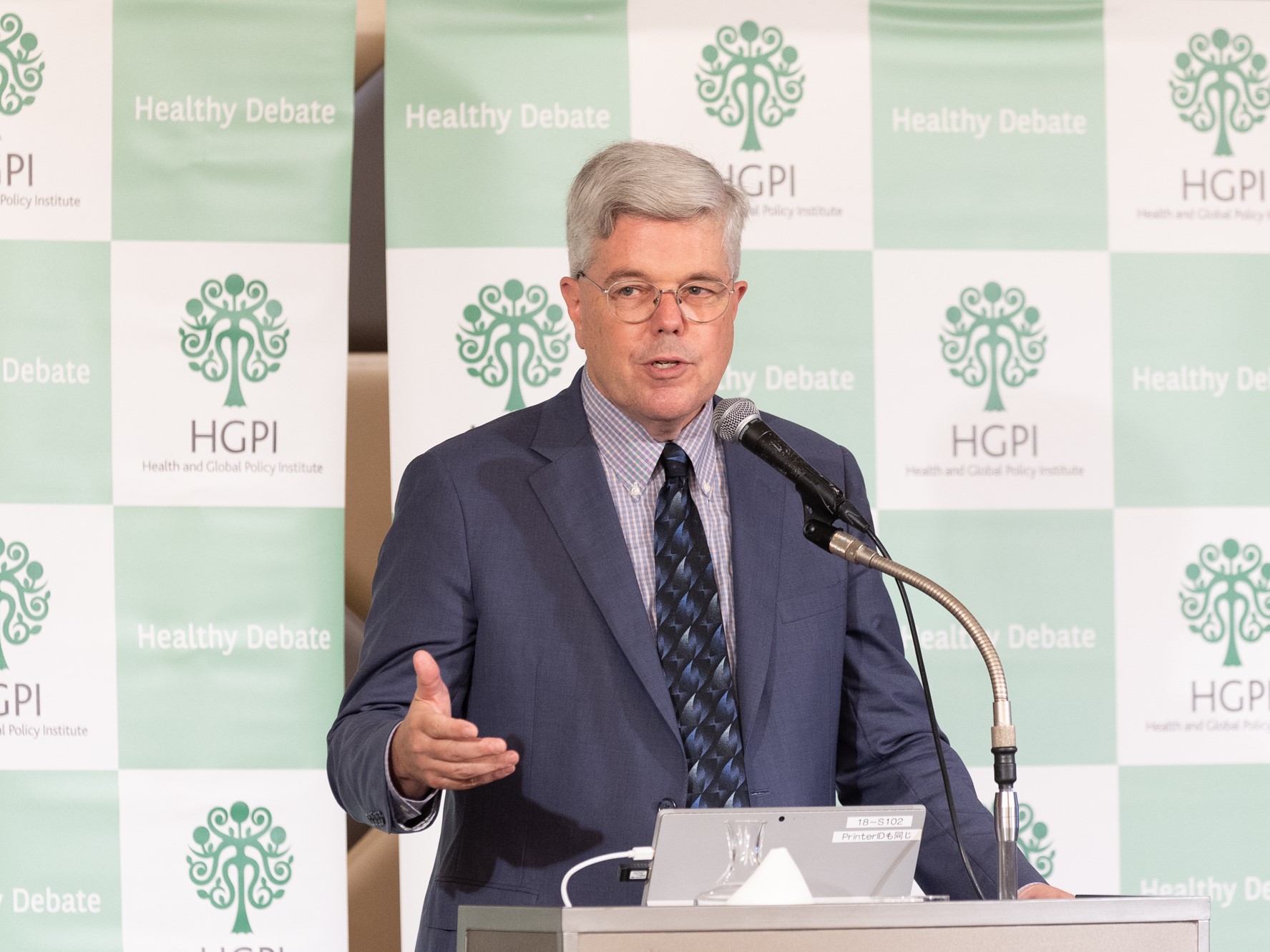[Event Report] The 53rd Special Breakfast Meeting –Shaping Global Health Rules from the Perspective of Japan’s chief negotiator: A Look into “pandemic accord” (January 31, 2024)
date : 4/30/2024
![[Event Report] The 53rd Special Breakfast Meeting –Shaping Global Health Rules from the Perspective of Japan’s chief negotiator: A Look into “pandemic accord” (January 31, 2024)](https://hgpi.org/en/wp-content/uploads/sites/2/20240131_SBM53-1.jpg)
For the 53rd Special Breakfast Meeting, we hosted Mr. Takeshi Akahori (Ambassador, Assistant Minister, Ministry of Foreign Affairs, Japan). His lecture focused on shaping Global Health Rules from the Perspective of Japan’s chief negotiator: A Look into “pandemic accord”.
Key points of the lecture
- Japan has advocated Human Security as one of the pillars of its foreign policy and contributed to addressing global health related challenges through its efforts in that area.
- Japan formulated the “Global Health Strategy” as its basic global health policy in May 2022 and has set policy goals of contributing to the creation of the global health architecture (GHA) and achieving universal health coverage (UHC). In its role as G7 Presidency, at the G7 Nagasaki Health Ministers’ Meeting and the G7 Hiroshima Summit in 2023, Japan also led G7 discussions focusing on (1) GHA, (2) UHC, and (3) Research and Development (R&D).
- WHO Member States held discussions on building and strengthening prevention, preparedness and response to global health crises based on lessons learned from the COVID-19 pandemic. In 2021, the Special Session of the World Health Assembly decided to establish an intergovernmental negotiating body (INB) to draft and negotiate a “pandemic agreement”. The INB is currently engaged in negotiations.
- Developing international norms through drafting and negotiating a “pandemic agreement” that strengthens prevention, preparedness, and response (PPR) for future pandemics is vital, also from the perspective of establishing GHA. Japan is committed to contributing constructively to these negotiations.
Japan’s efforts in the global health sector
Japan has consistently attached great importance to global health diplomacy. It set out “combatting infectious diseases” as an agenda item at the G8 Kyushu-Okinawa Summit in 2000, which led to the establishment of the Global Fund. Japan maintained global health diplomacy as a pillar of discussions when it later presided G7 (G8) and G20 Summits. While Japan advocates human security as a central concept of its foreign policy, Japan has engaged in enhancing global health diplomacy since health is an essential basis for achieving human security, protecting lives and dignity of every individual, being the fundamental condition for economic development and society stabilization. Global health has become mainstream with the recent launch of a number of global initiatives and public-private partnership funds, such as the Global Health Innovative Technology Fund (GHIT Fund).
Amidst these developments, the global outbreak of Coronavirus Disease 2019 (COVID-19) prompted the international community to discuss the so-called “pandemic agreement” as well as amendments to the International Health Regulations (IHR). On this occasion, I would like to outline Japan’s basic policy and efforts regarding the negotiations on a “pandemic agreement.”
note: the official title of “pandemic agreement” has yet to be finalized.
These negotiations are actively undertaken by the delegation of the Japanese government consisting of the Ministry of Foreign Affairs (MOFA) and the Ministry of Health, Labor and Welfare (MHLW) with cooperation with other related ministries and agencies.
Japan’s basic policy and contributions
In May 2022, Japan formulated the Global Health Strategy as its basic policy on global health. Global health is directly related to the wellbeing of people, furthermore to the peace and prosperity of the international community encompassing major economic, social, and security risks. Global health is a global issue that should be underlined from the perspective of human security as well as coexistence of humans and the Earth. I also believe that contributing to promoting global health can foster a better international environment which serves Japan’s national interest. In particular, infectious diseases are cross-border in nature and can be considered to be typical examples of global challenges, along with climate change.
One policy goal of the Global Health Strategy is to contribute to the development of the GHA for ensuring global health security and strengthening PPR (Prevention, Preparedness, and Response) for pandemics. The Global Health Strategy states Japan will contribute to enhancing international norms. Developing a pandemic agreement is one part of such efforts.
Another policy goal of the Global Health Strategy is to accelerate efforts to achieve more resilient, equitable, and sustainable UHC by reinforcing health systems. We aim to implement this initiative through the cooperation with the Japan International Cooperation Agency (JICA) and international organizations in terms of policy, concept and practice.
Japan has supported many countries, including to achieve UHC and strengthen COVID-19 response, and received acknowledgments for its support. Regarding The G7 Hiroshima Summit and the Nagasaki Health Ministers’ Meeting in May 2023 during Japan, as G7 Presidency, took the lead in presenting the initiatives of G7 in the areas of 1) GHA 2) UHC, and 3) R&D as the three pillars of the health sector in the G7 Hiroshima Summit Communiqué, which became a milestone of Japan’s global health diplomacy
Furthermore, in September 2023, 140 heads of state and government leaders gathered in New York during the UN General Assembly High-level Week 2023 to foster international consensus. There were three High Level Meetings (HLMs) for the health sector: the HLM on PPR on September 20, the HLM on UHC on September 21, and the HLM on Tuberculosis (TB) on September 22. In addition, Prime Minister KISHIDA Fumio received the Global Goalkeepers Award 2023 for Japan’s leadership focused on global health at the G7 Hiroshima Summit and years of immense contribution to this area.
Background of the IHR amendments and “pandemic agreement”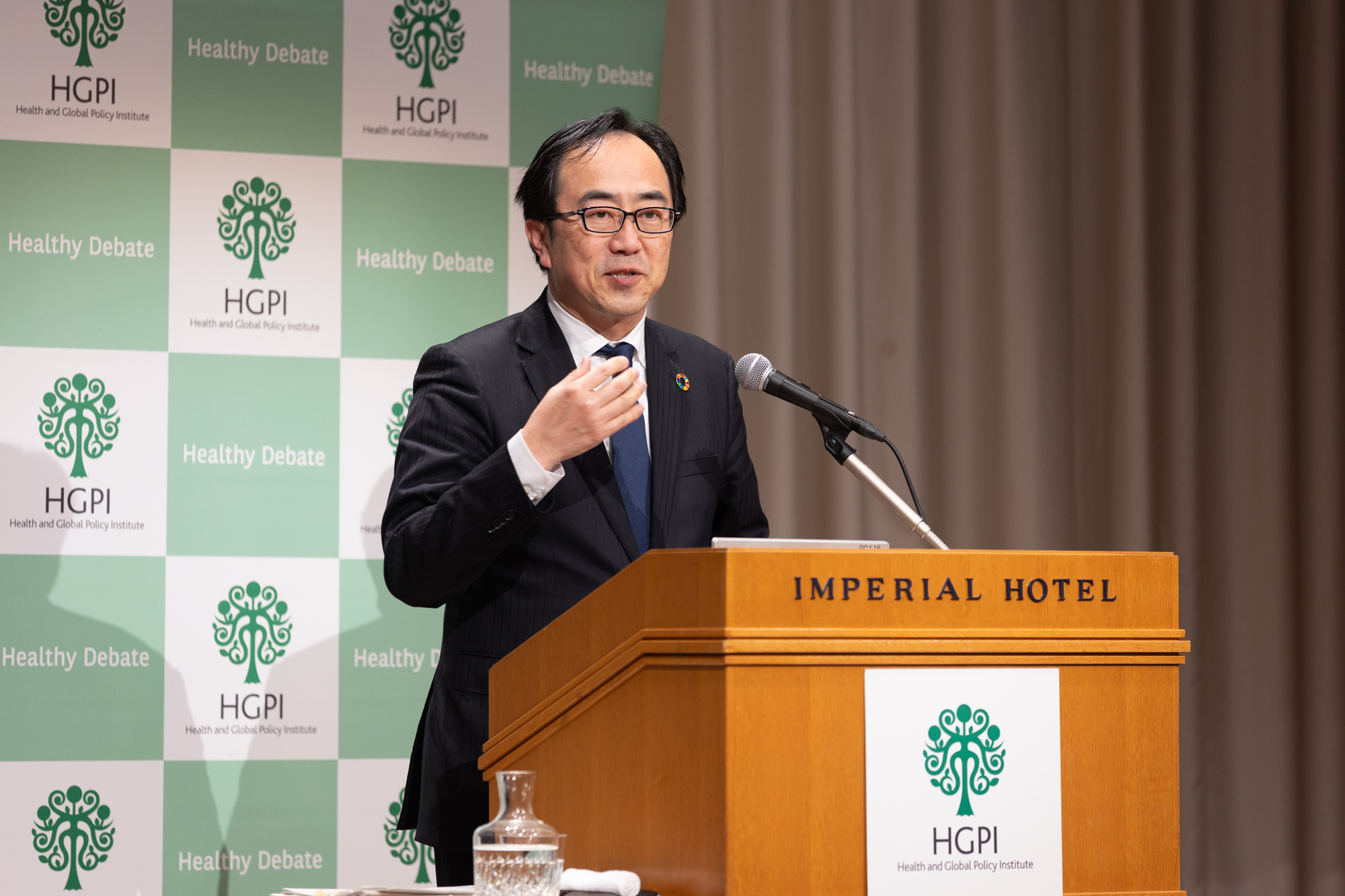
The International Health Regulations are regulations for the Member States of World Health Organization (WHO) aimed at preventing, protecting against and controlling the international spread of disease in way that avoids unnecessary interference with international traffic and trade. The IHRs stipulate the core capacities that countries should have in place for routine sanitation at airports, ports, and land border crossings, as well as for responding to public health events. After the experience of COVID-19 infection, there was a movement among the WHO Member States toward the amendments to IHR (2005) which was last revised in 2005. Discussions are now underway on issues and points that needs improvements with international consensus.
In parallel to these developments, some countries voiced the opinion that only the amendments of the IHR will be insufficient. In remarks presented at the G20 Summit 2020, President of the European Council Charles Michel provided the first mention regarding the necessity of an international agreement on pandemics. Moreover, at the WHO Executive Board meeting in January 2021, with the COVID- 19 situation in mind, the Board proposed to draft a legally binding instrument in order to prevent future pandemics and respond more rapidly in international collaboration, by complementing the IHR (2005).
Then, in May 2021, the 74th World Health Assembly (WHA) decided to establish a Member States Working Group on Strengthening WHO Preparedness and Response to Health Emergencies (WGPR) to discuss drafting and negotiating “pandemic agreement”. It also requested to convene a WHO Special Session at the end of November of the same year, where the following points were decided.
- the first meeting of the INB shall be held no later than 1 March 2022
- the INB shall identify the substantive elements of the instrument and then determine its format (a treaty, an agreement, a regulation, etc.)
- The INB shall work with the Member States Working Group on Strengthening WHO Preparedness and Response to Health Emergencies to avoid overlapping and incoherency between both processes.
- the INB shall submit its outcome for consideration by the Seventy-seventh World Health Assembly, with a progress report to the Seventy-sixth World Health Assembly
- member states continue discussions on strengthening the IHR (2005), including the targeted amendments
The first meeting of the INB in 2022 covered the working methods and format of the negotiations. Substantive discussions on the content of the new instrument began around the third meeting. As of January 2024, the INB was holding its seventh meeting (which was resumed), with the eighth and ninth meetings scheduled for February and March 2024. The deadline for submitting the outcome of the negotiation is May 2024.
(Editor’s note: on 1st June, 2024, at the 77th World Health Assembly the amendments to IHR (2005) was adopted by consensus and the extension of the negotiation on “pandemic agreement” was decided. )
Future prospects
With approximately four months to go until May 2024, the deadline for submitting the outcome of the negotiation,
some countries are beginning to think that they want to produce a good instrument and require more time to manage. While various opinions are being expressed, it will be essential for us to proceed the discussions forward on what to create, when to create it by, and what elements should be included for a success. Japan is committed to making constructive contributions to further process. In addition, the word “Sovereignty” is included in the principles of the current negotiating text, in Chapter 1 (Introduction), Article 3. Full respect for the sovereign rights of each country is essential for advancing discussions on the agreement, and no government has raised objections to this.
While the road ahead of us is still difficult to see, I overviewed the current situation and how Japan’s negotiation team is seriously engaged in the discussions to uphold Japan’s national interests and ensure PPR for future pandemics.
During the Q&A session after the lecture, there was a lively discussion with audience on topics such as the Global Health Strategy or how the “pandemic agreement” should be structured.
(Photo : Kazunori Izawa)
■Profile
Mr. Takeshi Akahori (Ambassador, Assistant Minister, Ministry of Foreign Affairs, Japan)
Takeshi AKAHORI is Ambassador, Assistant Minister (Director-General) for Global Issues of the Ministry of Foreign Affairs of Japan (appointed in January 2022). He is a member of the Gavi Board. Takeshi joined the Ministry in 1989 upon graduation from the University of Tokyo Law School. He graduated from the French Ecole nationale d’administration (ENA) in 1991, and also studied at the international relations graduate course (DHEI) of the French Insitut national de Langues et de Civilizations orientales before serving in the Embassy in Paris from 1992. Back in Tokyo, he worked on Southeast Asian affairs, UN policy, management, international law and North American affairs. He served as Counsellor at the Embassy in Washington, DC from 2004 to 2007. At Director level, he worked on Japan-Korea economic affairs, denuclearization of the Korean Peninsula, cultural diplomacy. After serving as Executive Assistant to the Foreign Minister, he served as Director for Treaties from 2012 to 2015. He was deeply involved in Japan’s new defense legislation and revision of the Guidelines for Japan US Security Cooperation. He then served as Political Minister of the Permanent Mission of Japan to the UN and led the Security Council team during Japan’s eleventh term (2016-17). He was responsible for the organization of the G20 Osaka Summit as Secretary-General (Ambassador). From July 2019 he served as Deputy Assistant Minister for Foreign Policy and as Ambassador for International Security, UN Affairs and Cyber Policy. He was a member of the Sixth UN Group of Governmental Experts on cybersecurity appointed by the UN Secretary-General. From August 2021, he led the Japanese delegation to UNFCCC COP26 as Ambassador for Climate Change Negotiations.
Top Research & Recommendations Posts
- [Policy Recommendations] Achieving a Sustainable Society of Health and Longevity Through the Integration of Environment and Healthcare-Incorporating a Planetary Health Perspective into the 3rd Phase of The Healthcare Policy-(December 20, 2024)
- [Research Report] Building a Mental Health Program for Children and Measuring its Effectiveness (June 16, 2022)
- [Policy Recommendations] Integrating Climate and Health for a Sustainable Society: Incorporating a Planetary Health Perspective into Nationally Determined Contributions (NDCs)(December 9, 2024)
- [Policy Recommendations] Developing a National Health and Climate Strategy for Japan (June 26, 2024)
- [Policy Recommendations] Policy Recommendations on Strengthening CKD Strategies for Workers: The Importance of Providing Early Detection, Intervention, and Support Through Screenings and Medical Visits (October 28, 2024)
- [Research Report] The 2023 Public Opinion Survey on Satisfaction in Healthcare in Japan and Healthcare Applications of Generative AI (January 11, 2024)
- [Event Report] Planetary Health Expert Meeting Aiming for Sustainable Healthcare: Learning from the Impact of Environmental Pollution and Medical Waste During the Pandemic (February 16, 2024)
- [Policy Recommendations] Obesity Control Promotion Project 2023 “The Next Steps for Engaging and Cooperating with Patients, Citizens, and Communities for Implements of Obesity Control Measurements” (April 8, 2024)
- [Announcement] A Turning Point Towards Building Green Healthcare Systems (June 5, 2024)
- [Research Report] Survey of Japanese Physicians Regarding Climate Change and Health (December 3, 2023)
Featured Posts
-
2024-11-25
[Registration Open] (Webinar) The 130th HGPI Seminar “Marking a Decade of the Act on Medical Care for Patients With Intractable Diseases: Connecting Intractable Diseases and Society From the Perspective of a Media Professional and Family Member” (January 28, 2025)
![[Registration Open] (Webinar) The 130th HGPI Seminar “Marking a Decade of the Act on Medical Care for Patients With Intractable Diseases: Connecting Intractable Diseases and Society From the Perspective of a Media Professional and Family Member” (January 28, 2025)](https://hgpi.org/en/wp-content/uploads/sites/2/hs130-top_JPNENG-1.png)
-
2024-12-18
[Policy Recommendations] Policy Recommendations on Strengthening CKD Strategies for Workers: The Importance of Providing Early Detection, Intervention, and Support Through Screenings and Medical Visits (October 28, 2024)
![[Policy Recommendations] Policy Recommendations on Strengthening CKD Strategies for Workers: The Importance of Providing Early Detection, Intervention, and Support Through Screenings and Medical Visits (October 28, 2024)](https://hgpi.org/en/wp-content/uploads/sites/2/HGPI_20241023_FY2024CKD_eyecatch.jpg)
-
2024-12-20
[Policy Recommendations] Achieving a Sustainable Society of Health and Longevity Through the Integration of Environment and Healthcare-Incorporating a Planetary Health Perspective into the 3rd Phase of The Healthcare Policy-(December 20, 2024)
![[Policy Recommendations] Achieving a Sustainable Society of Health and Longevity Through the Integration of Environment and Healthcare-Incorporating a Planetary Health Perspective into the 3rd Phase of The Healthcare Policy-(December 20, 2024)](https://hgpi.org/en/wp-content/uploads/sites/2/e8a714648913193b03d5b6ede38c161e.png)
-
2024-12-25
[Registration Open] (Hybrid Format) Expert Meeting “Innovations Required to Achieve Precision Psychiatry” (January 22, 2025)
![[Registration Open] (Hybrid Format) Expert Meeting “Innovations Required to Achieve Precision Psychiatry” (January 22, 2025)](https://hgpi.org/en/wp-content/uploads/sites/2/mh-20250122-topr-1.png)
-
2024-12-27
[Activity Report] Second UN General Assembly High-Level Meeting on AMR (September 26, 2024)
![[Activity Report] Second UN General Assembly High-Level Meeting on AMR (September 26, 2024)](https://hgpi.org/en/wp-content/uploads/sites/2/4ED86AF7-49DE-465D-B59D-843B4F3C6102_1_201_a-scaled-1.jpeg)




